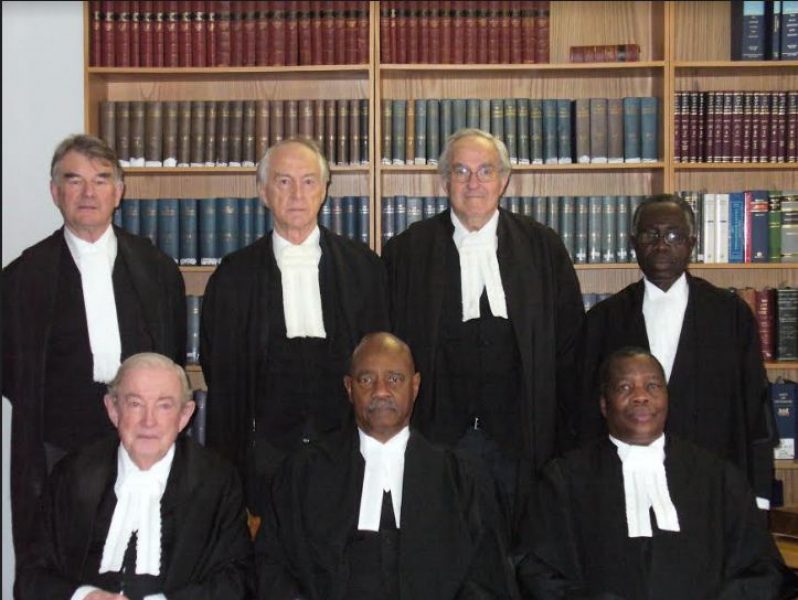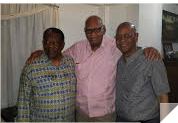
A CAREER as an attorney/ lawyer is one of the most sought-after, as it offers certain rewards and personal gratification.
The profession is embraced by men and women of all ages and colour and it is quite admirable to see the camaraderie and mutual level of respect that is maintained for each other whenever a case is completed, even though they at times work as adversaries.
Much of the landscape of the profession has changed in a positive way with the advent of technology, as legal research that previously took days to be accomplished is now available within hours.
Recently appointed Senior Counsel (SC) Stanley Alfred Moore, a veteran in the profession, is one of those who have toiled through these days. On Thursday, July 23, 2020, he marked his 50th year as a member of the legal fraternity, having begun his career on July 23, 1970.
Senior Counsel Moore during an interview with this publication, said he always had a penchant for the profession and recalled that he began undertaking studies on his own. Subsequently, he had the benefit of the late Frederick Rudolph Wills and Robert Rex Mc Kay as his tutors. McKay, he added, remains a life-long friend and mentor, to this day..
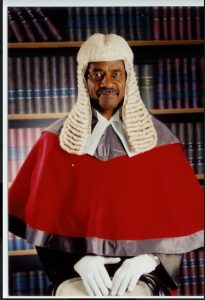
Moore has over the 50 years of years of service provided legal services for people from several parts of Guyana, in the Caribbean and farther afield, such as Botswana and Swaziland on the African continent. Today, he continues private practice from the Chambers of Rex Mc Kay and Moore, located on Croal Street in the city.
Born on July 1, 1935 to Olive Isabella Walcott-Moore, a seamstress and native of neighbouring Suriname and Llewelyn Cornette-Moore, who hails from New Amsterdam, the Senior Counsel recalled his parents bringing him and his brother, Carlyle, to live in the city at Kitty, when was about two years six months old.
His father worked as a marine engineer with the Transport and Harbours Department (T&HD), but was subsequently enlisted as a serviceman during World War 11. Moore said that after his father left Guyana in 1939, he was never seen again; hence his mother was left to bring up her two boys single-handedly. But despite the circumstances, Moore said his mother never one day shirked her responsibility and endured, so that both of her sons were given a sound education. She made education a priority for us, he added,
Moore also credited relatives on both sides of the divide, who lived in close proximity to each other, for his formative education which began at St James-the-Less Anglican and in 1947 he was awarded a Government Country Scholarship, that saw him attending Tutorial High School.
In 1953 he secured a job as a pupil-teacher at his alma mater but left after spending one year to work as a customs and excise officer. He recalled having applied for a job in the civil service in 1952, but noted that obtaining such a `prestigious’ job was quite competitive, explaining the reason why he called two years later, even though he possessed the required qualifications.
At customs, Moore said he was assigned duties at the Boat House, housed at the now defunct Georgetown Ferry Stelling and functioned as a water guard officer. It entailed him going mid-stream to board ocean-going vessels and issuing the legal authority for the ships to enter then British Guiana’s waters. During his tenure at customs, Moore also worked at various transit sheds.
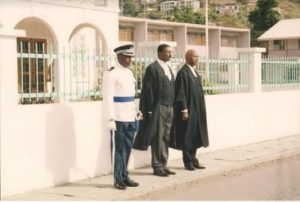
However, in 1960 he left customs and began working with the Booker Group of Companies as a commercial cadet management trainee. The following year he was appointed as administrative assistant to the chairman and when he quit in 1964, he had held the position of acting company secretary.
According to Moore, the four-year stint only opened his appetite further to pursue that life-long dream of his of becoming a lawyer. In addition, he said his interest peaked further during the famous `Hilton Dhoney’ murder case. “I used to pay keen interest during the trial that saw lawyers, Messrs Joseph Haynes, Rex Mc Kay and Fitzclarence, coming out as heroes,” he recalled.
By then, Moore had successfully written and obtained the LLB degree, set by a London-based university. Armed now with the tools to be a lawyer or an advocate, he said he began making arrangements to further his studies overseas. As a result of the amicable separation he had with Bookers, Moore said he was allowed to travel to London aboard Bookers’ newest ship, the “Booker Vanguard, arriving in Liverpool 11 days later.
“I would say it [was] quite a pleasant journey; even though I became sea- sick for most of the way, the captain and crew were all welcoming. The captain’s wife gave me some tablets that gave me almost immediate relief,” he recalled.
At Liverpool, Moore said he boarded a train at Lime Street that took him along a journey to Euston, where he was met by a party of Guyanese friends, among them Lawrence Mann and Mr Abrams, both of whom offered him brief accommodation. He subsequently secured a bed-sitter (a room in a house), enrolled at the Lincoln Inn and began studying earnestly for the English Bar examination.
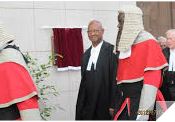
To assist with his expenses, even though he got some funds from his homeland, Moore said he secured a job with the London City Council, which enabled him to receive a 100 per cent mortgage and was able to purchase his own home. Moore got married in 1960 and the union spawned two children.
By 1970, he completed his final bar exams and acquired a Commonwealth scholarship to read for a Master’s Degree (LLM) at the University College of London.
He was also admitted to the Bar in Grenada in 1971 and in Antigua in 1989.
In 1981, Moore was appointed to serve as Minister of Home Affairs by then President L.F.S. Burnham, an appointment he relinquished after serving for one year..
During Moore’s eminent career, which included acting as Governor, Attorney General, Member of Parliament and Member of the Executive Council in the British Overseas Territory of Montserrat between 1990 and 1992; Justice of Appeal, Final Court, Republic of Botswana 2004 -2012 and the Kingdom of Swaziland 2010 to 2014; senior Justice Northern Region, Supreme Court of the Bahamas, Northern Division 2001 – December 2002; Senior Resident Justice, Eastern Caribbean Supreme Court (ECSC), British Virgin Islands .1996 -2000; Resident Judge, Grenada 1992-1996; Acting Magistrate, Guyana 1972 and High Court Judge, Guyana, in 1979.
He also served as a member on the Judicial and Legal Services Commission of the ECSC from 1999 to 2000, as well as on the Rules and Revision Committee of the ECSC during the said period.
Moore has also served in other capacities as an Honorary Master of the Bench at Lincoln’s Inn, London; Associate Member of the American Bar Association; and has had extensive practice in Constitutional, Civil, Commercial and Criminal law in Grenada, Montserrat and Guyana during the period 1970 to 1992.
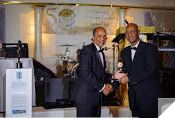
Between the years 1972 and 2006, he was engaged in lecturing at the University of Guyana and as a visiting Professor at Florida State University, and participated in Lecture Tours to the Republic of South Africa in 2004. In addition to being a Fellow of the Commonwealth Judicial Institute, he has also served on several Commissions of Inquiry, Tribunals held in either Florida, The Bahamas, Bermuda, Grenada or Montserrat. Here in Guyana, Moore served as the lone Commissioner and Chairman of various Commissions of Enquiry held between 1970 and 1990.
Moore has authored several publications, titled `Offshore banking, Friend or Foe, Commonwealth Secretariat’; and `The Right to a fair Trial and Access to Justice in the Commonwealth Caribbean- Interrights’. Another `A Manual for Police Prosecutors in the Commonwealth Caribbean he helped to co-author.
Moore, who was appointed a Senior Counsel by President David Granger on January 1, 2020, has overtime been awarded several plaques in recognition of his achievements. While studying in London, he was in 1967 adjudged the first winner of the prestigious Eric Crowther Shield, and that same year was voted Student Advocate of the Year at Lincoln’s Inn.
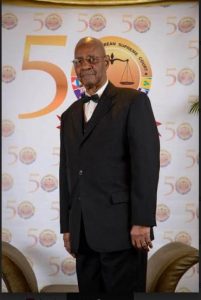
Senior Counsel Moore noted that over the last century he has taken note of “a welcome transition of the use of digital science in the operation of the courts,” and opined that it must continue.
He spoke too about an improvement in gender balance in that several more females are now practising as attorneys and sitting as judicial officers, than previously. Also, there has been a pleasant presence of attractive flowers and greenery in the compound of the High Court.
He, however, is of the view that more resources should be made available to the judiciary for the enhancement of library and other facilities, for the furthering of higher education and the training of judicial officers.
Additionally, Senior Counsel Moore advocates that more judicial officers be appointed to help cope with the volume of matters now being filed in the courts.


.jpg)





